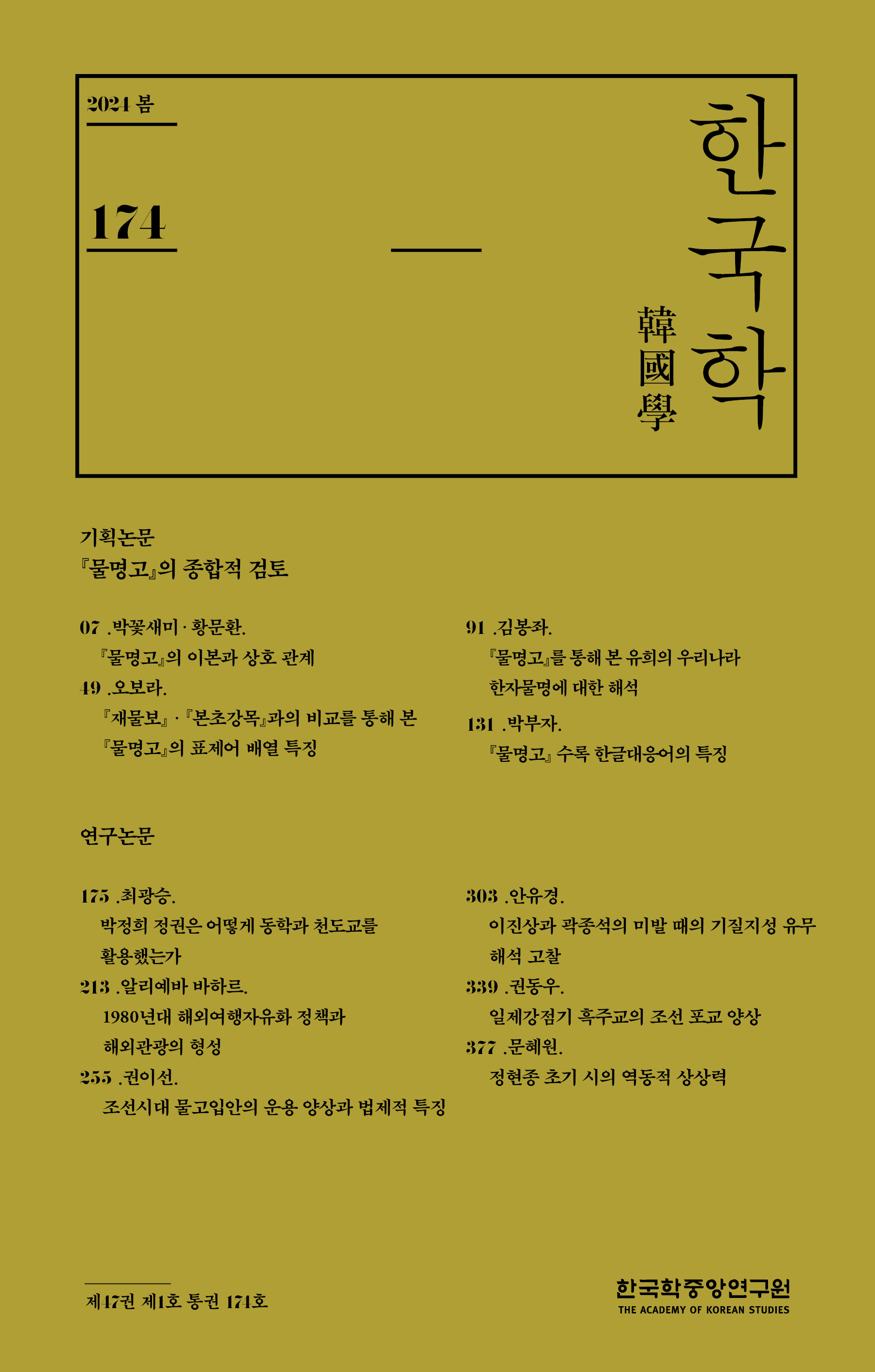
- P-ISSN 2671-8197
- E-ISSN 2733-936X
.jpg)
Confucianism is the study of Weiji(爲己) (for oneself) and Weiren(爲人) (for others). Confucius extends the challenge of learning to the area of Weiren beyond Weiji. The Confucian Methodology of WeijiWeiren is integrated into the system of Sugiianin (self‒cultivation to give comforts to others) reinforcing the universality with Kyung (respect)·Anin (comforting others)·Anbaekseong (comforting people) through self‒cultivation. However, it is true that Kyung· Anin·Anbaekseong through self‒cultivation impose an excessive burden on a ‘noble man’, the subject of self‒cultivation like Archimedean point and today’s subject of self‒cultivation is not a noble man but unselfish dasein. Thus, if ‘Angi’ (comforting oneself), that is, stable living ensuring stable mind is not guaranteed for unselfish dasein, it is difficult to practice Anin·Anbaekseong, relief of many people as expansion of family love. And the lack for Anjayeon (comforting nature) in Sugiianin system has limits that cannot seek suitable alternative for modern ecological problems. Therefore, unselfish dasein, the subject of Sugi and otherness of Anin should be understood as the virtuous cycle system of mutual subjectivity that deepening of Sugi leads to the strengthening of Anin and the strengthening of Anin, in turn, results in deepen‒ ing of ‘Angi’. Such understanding can be said to expand the possibility as an alternative reason opening the possibility of communication with others (Encompassing nature) through the deepening of autonomy of dasein.
四書集註
荀子
與猶堂全書 , 第二集經集, 第十三卷, 2007.
유교문화연구소 역, 논어 . 「헌문」, 성균관대학교출판부, 2005.
栗谷全書 . 민족문화추진회, 1989.
二程集 . 北京: 中華書局, 2004.
朱子語類 . 北京: 中華書局, 1999.
전주향교, 논어 . http://cafe.daum.net/2jhg.
한국고전종합 DB. http://db.itkc.or.kr/itkcdb/mainIndexIframe.jsp, 한국고전번역원.
강돈구, 「보편적 해석학의 기초로서의 언어와 사유」. 哲學 , Vol. 24, No. 2, 1985, 31‒53쪽.
강돈구, 「해석학적 순환의 인식론적 구조와 존재론적 구조: 슐라이어막하와 가다머」. 哲學硏究 Vol. 23, No. 1, 1988, 151‒184쪽.
김동인, 「爲己之學 爲人之學」. 교육사학연구 11권, 교육사학회, 2001, 53‒70쪽.
김승혜, 原始儒敎 . 믿음사, 1988.
김영수, 논어 . 일신사, 1994.
김학주 역주, 논어 . 서울대학교출판문화원, 2012.
류승국, 한국유학사 . 유교문화연구소, 2008.
리링(李零) 저, 김갑수 역, 집 잃은 개 Ⅰ, Ⅱ . 글항아리, 2012.
리쩌허우(李擇厚) 저, 임옥균 역, 논어금독 . 북로드, 2006.
미조구치 유조 저, 정태섭·김용천 역, 중국의 공과 사 . 신서원, 2004.
박성규, 논어 . 철학사상 별책 제5권 제1호, 서울대학교 철학사상연구회, 2005.
박정원, 「修己와 治人 개념을 통한 철학 교육적 인간상 탐구」. 철학윤리교육연구 40호, 2008, 29‒50쪽.
벤자민 슈워츠 저, 나성 역, 중국 고대 사상의 세계 . 살림, 2004.
볼프강 벨쉬 저, 박민수 역, 우리의 포스트모던적 모던 1·2. 책세상, 2001.
비트겐슈타인 저, 이영철 역, 논리철학논고 . 책세상, 2006.
成百曉, 大學·中庸集註 . 傳統文化硏究會, 1999.
成百曉, 論語集註 . 傳統文化硏究會, 2001.
成百曉, 孟子集註 . 傳統文化硏究會, 2004.
송영배, 중국사회사상사 . 한길사, 1986.
송영배, 「유교의 사회윤리론과 도덕 형이상학에 대한 반성」. 가톨릭 신학과 사상 , 제44차 세계성체대회 기념 국제학술회의, 1989, 32‒51쪽.
송하경 외, 한국유학과 열린 사유 . 심산, 2008.
A. C. 그레이엄 저, 이현선 역, 정명도와 정이천의 철학 . 심산, 2011.
오석원, 한국 도학파의 의리사상 . 유교문화연구소, 2005.
유권종, 「주희의 위기지학고찰」. 철학탐구 제33집, 중앙대학교 철학연구소, 2013, 1‒30쪽.
이기동, 맹자강설 . 성균관대학교출판부, 1998.
이기동, 논어강설 . 성균관대학교출판부, 1999.
이남인, 후설 엄밀학으로서의 철학 . 서울대학교 철학사상연구소, 2006.
이종선, 수기안인의 내재적 초월성 연구 . 성균관대학교 박사학위논문, 2012.
이종선, 「수기치인론에 관한 반성적 고찰」. 문화예술연구 제3집, 문화예술콘텐츠 연구소, 2014, 29‒53쪽.
임헌규, 「孔子의 ‘爲己之學’의 이념과 방법」. 東洋古典硏究 Vol. 36, 동양고전학회, 2009, 8‒30쪽.
임헌규, 「南冥의 爲己之學 이념」. 溫知論叢 29권, 온지학회, 2011, 7‒32쪽.
최영진, 유교사상의 본질과 현재성 . 유교문화연구소, 2003.
풍우란 저, 박성규 역, 중국철학사 . 까치, 1999.
허버트 핑가레트 저, 송영배 역, 공자의 철학 . 서광사, 1993.
현남숙, 헤게모니와 문화적 실천 . 이화여자대학교 박사학위논문, 2007.
황금종, 「주자학의 공부 원리로서의 “위기지학”, “하학이상달”, “존덕성이도문학”」. 한국교육사학 31권, 한국교육사학회, 2009, 169‒187쪽.